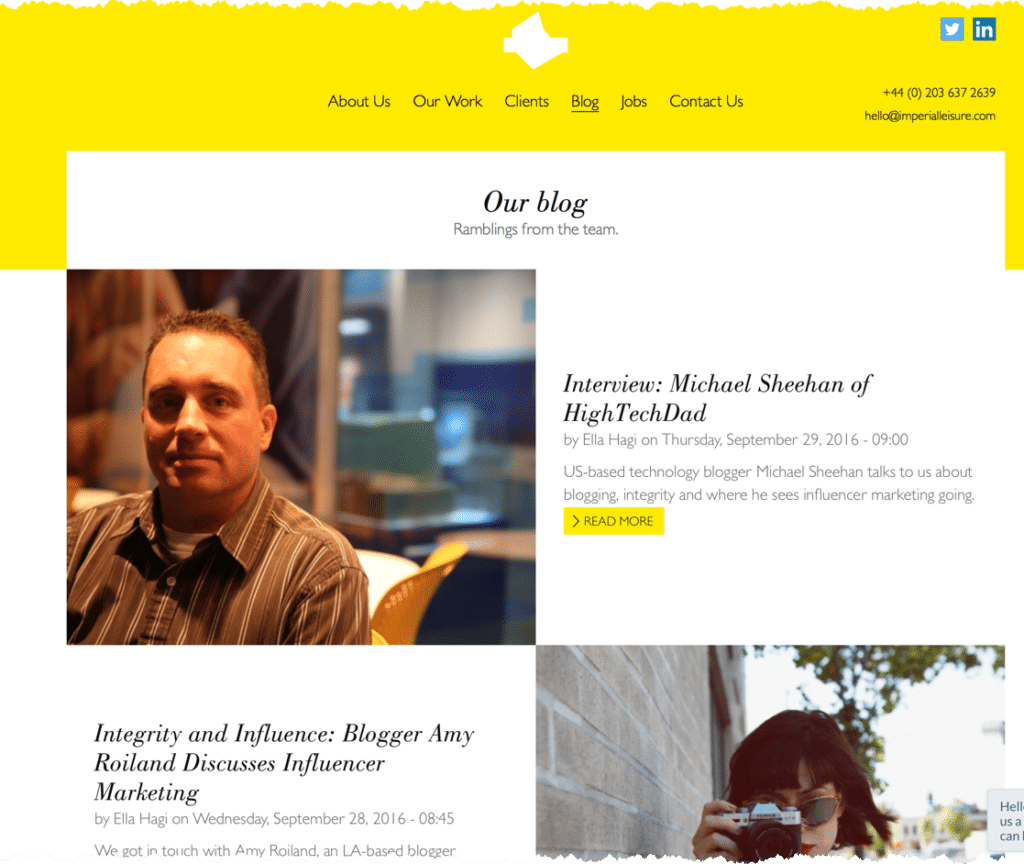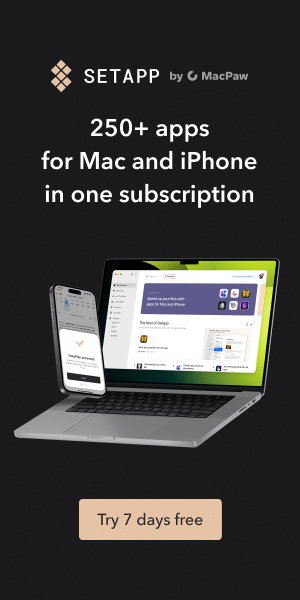From time to time I’m asked to voice my “expert”opinion on a variety of topics ranging from parenting to technology to digital marketing to writing. I put “expert” in quotations because I must acknowledge the fact that I am by far NOT an expert in any of those topics. I have, however, had lots of experience with each and formed my own opinions along the way. And, given the fact I have been writing about them for many, many years, I guess a few people have read my thoughts and ideas and taken notice. Recently I was contacted by Imperial Leisure, a creative communications, viral marketing, digital advertising and social media agency located in London wondering if I could share my insights into a few topics, specifically brands, blogging, influencers, technology and more.
Of course, I was honored, flattered and happy to share my thoughts! The interview was originally published on the Imperial Leisure blog, but I have also included the questions and answers here for convenience. If you have questions or comments on any of my answers, feel free to leave them on this article but I encourage you to do so on their original interview as well.
Repost of Imperial Leisure interview
Imperial Leisure: Collaborations between brands and influencers are popping up all over the place. Some involve campaigns with flashy photography, others focus on driving social conversations. While these projects come in different shapes and sizes, one thing is for certain: influencers are here to stay. We wanted to get some insight into the inner world of an influencer.
Behind our respective screens, we sat down with the US-based technology blogger Michael Sheehan to do just that. His blog HighTechDad has been going for over ten years, and while Michael doesn’t love the term ‘influencer’, tech companies are queueing for him to write about their products. Here, Michael talks to us about blogging, integrity and where he sees influencer marketing going.
Imperial Leisure: Tell us a bit about your background. I know you did a degree in English. What made you jump from that to technology?
Michael Sheehan: Believe it or not, I have encountered quite a few people who also work in the technology field and who have liberal arts educations. I think it boils down to liberal arts education teaching how to read, write, analyse and articulate. But also, I live and work in the San Francisco Bay Area, a place ripe with everything from tech startups to established technology companies so as I have been exposed to tech for many, many years, it seems logical that I might also jump to technology. But, the reality is, I just really enjoy technology. I believe there are some people who understand tech and some people who don’t. I guess I just get it.
IL: You’ve been blogging for over a decade now. What made you get into it?
MS: Over a decade ago, a friend suggested that I write a how-to book. This was long before blogging formally existed. But as I researched what was involved in writing and publishing a book, I realised it was cost prohibitive and had other challenges. The introduction of blogging via WordPress was the perfect solution. For starters, since I wanted to write about technology, gadgets and consumer electronics as well as how-to and fix-it articles, having an online environment made the most sense. It was much more “living” that a printed equivalent. It could be easily updated and shared, and it promoted discussion. I’m still kicking around an idea of writing a book and someday perhaps I will attempt that, but for now, my site provides me with energy and enjoyment via sharing helpful and informative articles. But honestly, I started reviewing tech products many years ago because I couldn’t actually afford to purchase the gadgets myself. It’s a bit of an addiction. I had a friend who had a PR agency and he started sending me smartphone cases to review and over the years, it snowballed to many other types of products.
IL: What’s made your blog so successful?
MS: Ha ha, well success is relative I believe. While I am extremely happy with the number of visitors and views I have, as well as the many opportunities I have been given from brands and companies, I also feel like I’m just getting started and have much larger aspirations. My blog is currently really just a hobby. But back when I was just writing about tech, my family was young. I realised that there were plenty of sites talking about and reviewing technology and other sites about parenting, but there weren’t any or were very few sites that talked about how technology works within the family environment. So I decided that was the niche I would pursue. It gave me the luxury of receiving and reviewing tech and gadgets, but also allowed me to look at the tech from the perspective of a parent. In all of my reviews, I do my best to fold in how a product or service actually works (or doesn’t) within a family environment. While that niche is fairly specific, it seemed to work pretty well. But also, I believe the success came from writing about topics that were timely (e.g., advice to parents about social media), helpful (e.g., how to fix software or hardware issues), and relevant (e.g., reviews of the latest and greatest trendy gadgets).
IL: You hold a full-time job in the technology sector. How do your blog and day job feed into one another?
MS: I recently realised that having a site like mine is extremely relevant to being a content and digital strategist professionally. It allows me to see and understand both sides of a campaign or strategy. On HighTechDad, I’m pitched by brands, companies and agencies on a regular basis. I know what I like and what gets me excited to work with a brand, as well as what doesn’t. I can then take that knowledge and use it on my professional side as I formulate content, marketing or digital strategies and campaigns. For example, continuity is extremely important. On the HighTechDad side, I really enjoy working with those brands who build a relationship with me. While I’m happy to do one-hit opportunities, longevity and continuity go a long way. As a professional, I also realise what I would want an influencer, advocate or blogger to do with my product, service or brand. So when I write on HighTechDad, I make all attempts to keep that in mind, especially if they are sponsored pieces of content. Both sides, professional and blogger, feed and enrich the other.
IL: From a company’s perspective, how do they benefit from working with an influencer like yourself?
MS: It’s interesting actually. I don’t really like the whole “influencer” title. I use it currently because it is popular and people understand it, and heck, who wouldn’t want to make a living off of being influential about something. But, I would rather characterise myself as an “advocate” which is a little bit different. I feel (and preach about this) that influencers are a bit over-hyped. They potentially get paid lots of money to merely mention a product or brand. There is no guarantee that they believe in the product or have even used it. And frequently their audiences are so large, they cannot truly interact with them. Advocates, on the other hand, tend to have smaller audiences or followers, but are extremely passionate about products or brands and truly engage with their followers. I feel that advocates are a bit more authentic and while their audience numbers might not be as large, they are more willing to work with a brand to be successful in their activities. And they are often much less “expensive” than influencers. So while I will use the influencer term to describe myself, I would rather categorise myself as an advocate, using my descriptions above.
IL: Where do you see influencer marketing heading?
MS: I feel that it’s peaking. I feel that influencers are overpaid and marketing organisations are wasting precious budgets on influencers who may get a temporary initial spike in activity but who then move on to the next opportunity with little or no affinity to the previous activity. I think that marketing organisations will begin to realise this and move on to the next big thing. But, influencers are often tied to the social platforms they are influential within. So there are ways for influencers to emerge and keep the trend going. I do hope that brands and marketing organisations will be careful in choosing who will represent them within these audiences and social programs. Would things be better handled with a few advocates or one influencer? And I believe it is important to understand the type of content these “influencers” are producing. Is it relevant? Is it engaging? Is it intelligent? Is it helpful? I think, though, influencer marketing will continue chugging along until the next big thing appears. Then it will be a staple much like content marketing is, and it will be folded into all things digital.
IL: What do brands expect when they get in touch with you?
MS: There doesn’t seem to be a standard of expectations, honestly. There are times when I contact a brand because I really want to review a product and see it in action or because one of my readers asked me about it. Other times, I am pitched by brands or their agencies either because they have a new product or service they want to amplify or introduce, or they need to get some bounce to their existing product or service. And there are times when I’m asked to generate sponsored content. In those cases, the sponsored content must be relevant to me and my audience. But in terms of expectations, many times, there aren’t any. Most of the time, I will not share drafts of my articles prior to publication, the exception being with sponsored content but even then I need to maintain integrity. Obviously, brands expect people to rave about their product and service. So when you think about integrity, you need to be sure you are balanced and honest.

IL: How do brands take to your honesty when writing about their products?
MS: Honesty, authenticity and transparency are critical to me. If someone gives me something for free, pays for a trip to have me see a product first hand, or pays me for content, I must disclose that not only because it is required by law, but also because I don’t want people to think of me as insincere. From the beginning of my writing, I have always followed these ideas – if a product is horrible or I just can’t find more positive than negative in it, I will simply not write about it. It doesn’t do me any service and it doesn’t provide the brand any help. I will provide direct feedback offline to the brand if they want it. For those products or services that I do write about online, I will always talk about the great thing, but also mention things I would like improved. Constructive criticism is important. I think brands understand this and it makes the content more authentic.
IL: Your love for technology seems to know no limits – what’s the one gadget or programme you can’t envision life without?
MS: That is a tricky one to answer. Perhaps that “can’t live without” gadget hasn’t been invented yet. I have “ADH…ooooh shiny” and I’m easily distracted by the next exciting consumer electronic or gadget. But I’m always in search of relevant and helpful technology, for me, my family and others.
I’m always excited to answer any questions brands, marketeers, parents and others may have. If you’d like to chat, please fill out one of my Contact forms and I will get back with you quickly.
HTD says: It’s always an honor to be asked an opinion about something. I encourage others to listen and ask questions, as that is what allows us to grow as people and individuals.





2 comments
Dadult
Interesting read. I do genuinely think that it is quite difficult to leave a negative comment on a product or service that has a high financial value that you potentially receive for free, don’t you think?
hightechdad
Actually that is a great comment. If I receive something for free and I hate it, I won’t write about it. I feel it doesn’t do anybody a service. If people ask me about it directly, I will tell the truth. I always try to have something negative or could be improved in all reviews if I can to provide balance.